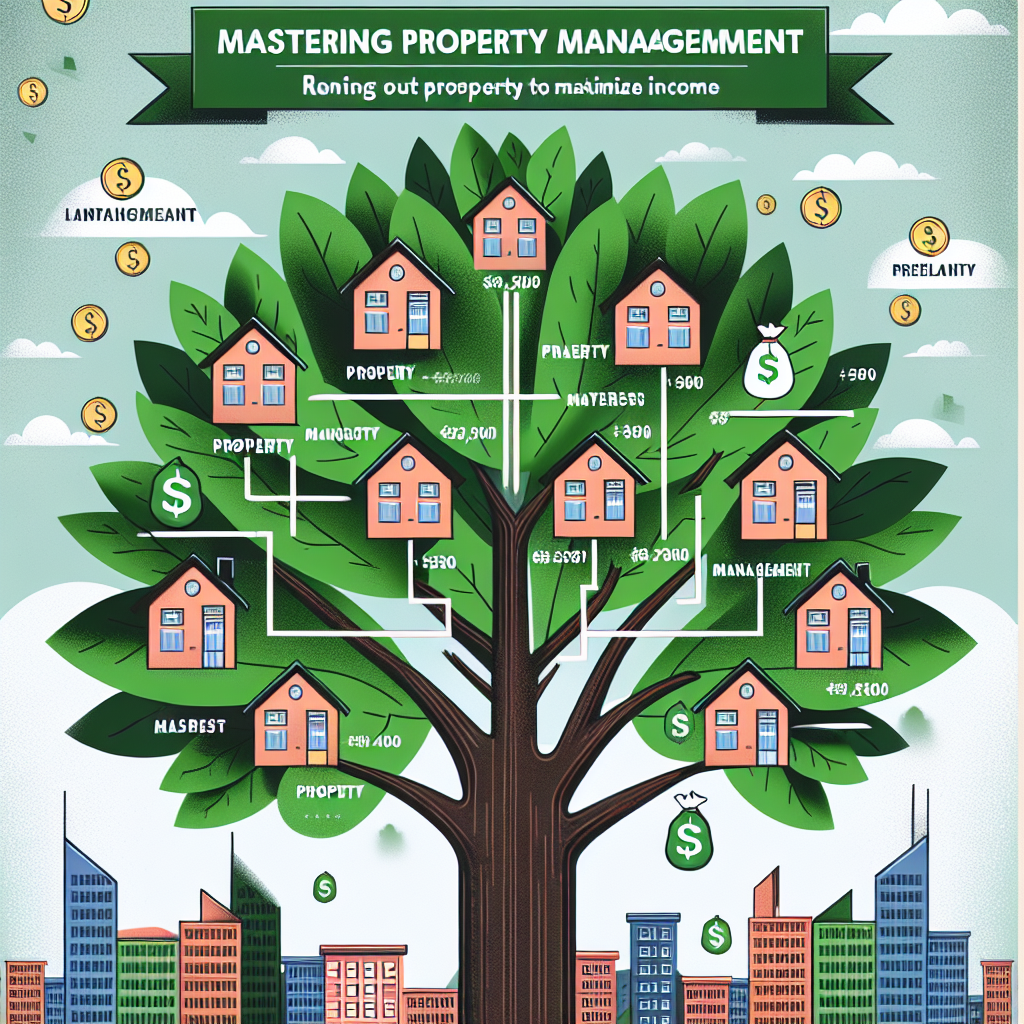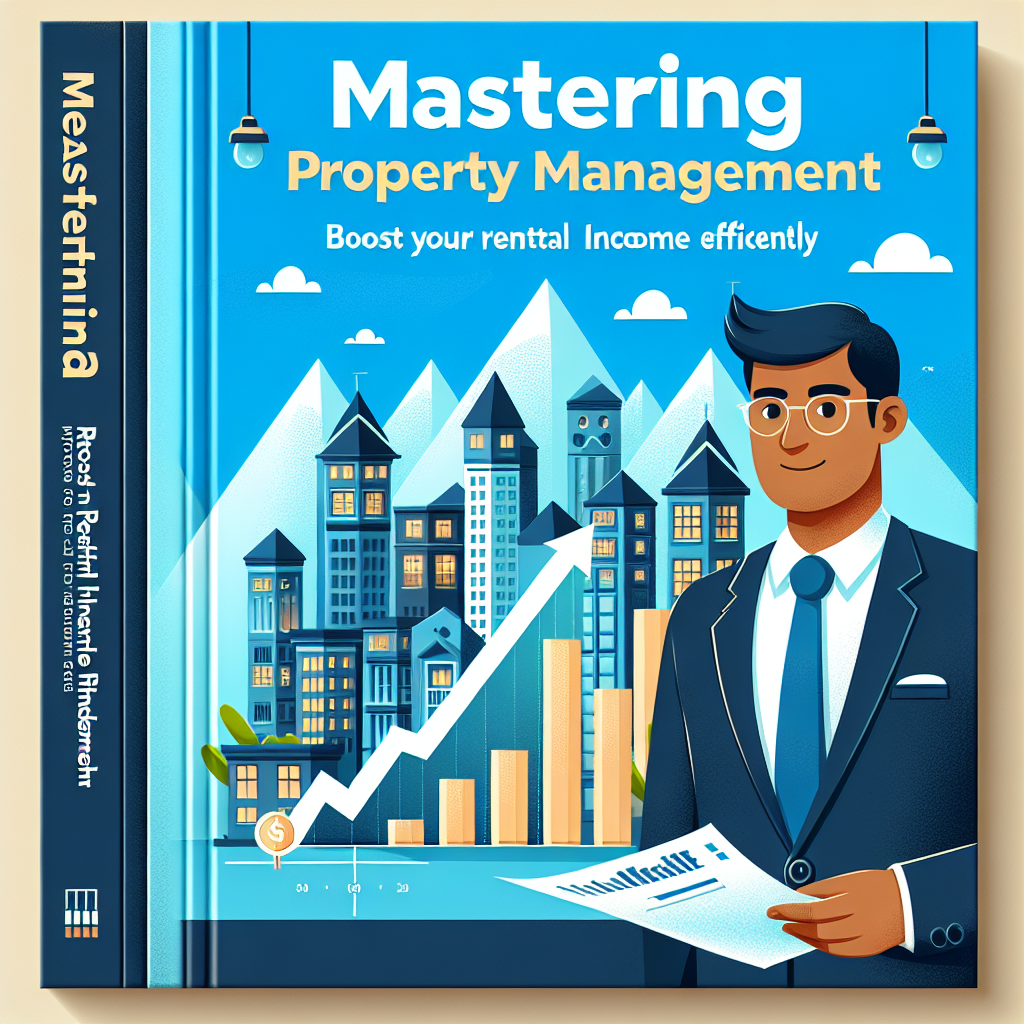-
Table of Contents
- Mastering Property Management: Boost Your Rental Income Efficiently
- Understanding the Basics of Property Management
- Responsibilities of a Property Manager
- Understanding the Rental Market
- Legal Requirements
- Strategies to Boost Rental Income
- Enhancing Property Appeal
- Renovations and Upgrades
- Regular Maintenance
- Optimizing Tenant Selection
- Screening Process
- Lease Agreements
- Implementing Efficient Rent Collection
- Online Payment Systems
- Incentives for Timely Payments
- Cost Management and Efficiency
- Energy Efficiency
- Preventive Maintenance
- Outsourcing vs. In-House Management
- Leveraging Technology
- Property Management Software
- Smart Home Technology
- Case Studies and Examples
- Case Study: Increasing Rental Income through Renovations
- Case Study: Implementing Online Rent Collection
- Conclusion
Mastering Property Management: Boost Your Rental Income Efficiently

Property management is a multifaceted discipline that requires a blend of strategic planning, effective communication, and meticulous attention to detail. For landlords and property managers, the ultimate goal is to maximize rental income while minimizing expenses and maintaining tenant satisfaction. This article delves into the essential strategies and best practices for mastering property management to boost your rental income efficiently.
Understanding the Basics of Property Management
Before diving into advanced strategies, it’s crucial to understand the foundational aspects of property management. This includes knowing your responsibilities, understanding the rental market, and being aware of the legal requirements.
Responsibilities of a Property Manager
A property manager’s duties can be broadly categorized into three areas:
- Tenant Management: This includes screening potential tenants, handling lease agreements, and addressing tenant concerns.
- Property Maintenance: Regular inspections, repairs, and upkeep to ensure the property remains in good condition.
- Financial Management: Collecting rent, managing budgets, and keeping accurate financial records.
Understanding the Rental Market
To set competitive rental rates and attract quality tenants, you need to understand the local rental market. This involves:
- Researching comparable properties in your area.
- Analyzing market trends and economic indicators.
- Understanding the demographics and preferences of potential tenants.
Legal Requirements
Compliance with local, state, and federal laws is non-negotiable. Key legal aspects include:
- Fair housing laws.
- Tenant rights and landlord responsibilities.
- Health and safety regulations.
Strategies to Boost Rental Income
Once you have a solid understanding of the basics, you can implement strategies to increase your rental income. These strategies range from improving property appeal to optimizing operational efficiency.
Enhancing Property Appeal
First impressions matter. Enhancing the appeal of your property can attract higher-paying tenants and reduce vacancy rates.
Renovations and Upgrades
Investing in renovations and upgrades can significantly increase your property’s value and rental income. Consider:
- Modernizing kitchens and bathrooms.
- Installing energy-efficient appliances.
- Improving landscaping and curb appeal.
According to a report by the National Association of Realtors, kitchen renovations can yield a return on investment (ROI) of up to 80%, while bathroom remodels can offer an ROI of around 70%.
Regular Maintenance
Regular maintenance not only preserves the property’s value but also keeps tenants satisfied. A well-maintained property can command higher rents and reduce turnover rates.
Optimizing Tenant Selection
Choosing the right tenants is crucial for maintaining a steady rental income. Effective tenant screening can minimize the risk of late payments, property damage, and evictions.
Screening Process
Implement a thorough screening process that includes:
- Credit checks.
- Background checks.
- Employment and income verification.
- References from previous landlords.
According to TransUnion, tenants with a credit score above 650 are less likely to default on rent payments.
Lease Agreements
Clear and comprehensive lease agreements can prevent misunderstandings and disputes. Ensure your lease covers:
- Rent amount and due date.
- Security deposit details.
- Maintenance responsibilities.
- Rules and regulations.
Implementing Efficient Rent Collection
Efficient rent collection is vital for maintaining cash flow and reducing administrative burdens.
Online Payment Systems
Offering online payment options can streamline rent collection and reduce late payments. Benefits include:
- Convenience for tenants.
- Automated reminders and receipts.
- Reduced risk of lost or delayed payments.
A survey by the National Multifamily Housing Council found that 78% of renters prefer to pay their rent online.
Incentives for Timely Payments
Consider offering incentives for timely payments, such as:
- Discounts on rent.
- Gift cards or rewards.
- Entry into a monthly prize draw.
Cost Management and Efficiency
Boosting rental income isn’t just about increasing revenue; it’s also about managing costs effectively. Here are some strategies to optimize your expenses.
Energy Efficiency
Investing in energy-efficient upgrades can reduce utility costs and appeal to environmentally conscious tenants. Consider:
- Installing LED lighting.
- Upgrading to energy-efficient HVAC systems.
- Adding insulation and weatherproofing.
The U.S. Department of Energy estimates that energy-efficient upgrades can reduce energy bills by up to 30%.
Preventive Maintenance
Preventive maintenance can save money in the long run by addressing issues before they become major problems. Implement a preventive maintenance schedule that includes:
- Regular inspections.
- Seasonal maintenance tasks.
- Prompt repairs of minor issues.
Outsourcing vs. In-House Management
Deciding whether to outsource property management or handle it in-house depends on various factors, including the size of your portfolio and your expertise. Consider the pros and cons:
- Outsourcing: Professional management companies can offer expertise and save time but come with management fees.
- In-House: Managing properties yourself can save money but requires significant time and effort.
Leveraging Technology
Technology can streamline property management tasks, improve tenant communication, and enhance overall efficiency.
Property Management Software
Investing in property management software can automate various tasks, including:
- Rent collection and accounting.
- Maintenance requests and tracking.
- Tenant communication and document management.
According to a survey by Buildium, 57% of property managers reported that property management software improved their efficiency.
Smart Home Technology
Smart home technology can enhance tenant satisfaction and reduce operational costs. Consider installing:
- Smart thermostats for energy efficiency.
- Smart locks for enhanced security.
- Smart lighting for convenience and savings.
Case Studies and Examples
Real-world examples can provide valuable insights into effective property management strategies.
Case Study: Increasing Rental Income through Renovations
A property owner in Austin, Texas, invested $20,000 in renovating a two-bedroom apartment. The upgrades included modernizing the kitchen, updating the bathroom, and installing energy-efficient appliances. As a result, the monthly rent increased from $1,200 to $1,500, yielding an annual increase of $3,600 in rental income. The ROI on the renovation was achieved within five years.
Case Study: Implementing Online Rent Collection
A property management company in New York City implemented an online rent collection system. Within six months, the percentage of on-time payments increased from 70% to 95%. The company also reported a 30% reduction in administrative time spent on rent collection and record-keeping.
Conclusion
Mastering property management requires a combination of strategic planning, effective tenant management, and cost optimization. By enhancing property appeal, optimizing tenant selection, implementing efficient rent collection systems, and leveraging technology, you can boost your rental income efficiently. Regular maintenance, energy-efficient upgrades, and a thorough understanding of the rental market are also crucial components of successful property management. By adopting these best practices, you can achieve long-term financial success and tenant satisfaction.
In summary, the key takeaways for boosting rental income efficiently include:
- Understanding the basics of property management.
- Enhancing property appeal through renovations and regular maintenance.
- Optimizing tenant selection with thorough screening processes.
- Implementing efficient rent collection systems, including online payments.
- Managing costs through energy efficiency and preventive maintenance.
- Leveraging technology to streamline operations and improve tenant communication.
By mastering these strategies, you can maximize your rental income and ensure the long-term success of your property management endeavors.








